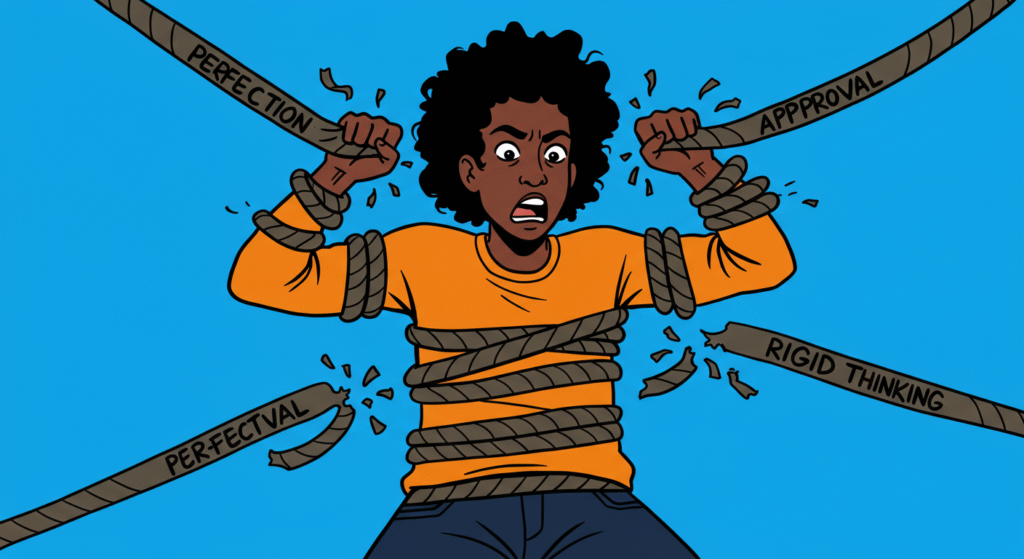Most people think success comes from having more money, more tools, more time. But the real edge? It’s being resourceful. When things don’t go as planned, resourceful people don’t freeze; they adapt, create, and move forward. Whether you’re leading a team, building a business, or guiding others through coaching, resourcefulness is the mindset that turns challenges into opportunities.
In this article, we’ll explore what true resourcefulness looks like, why it matters more than raw talent or resources, and how to develop it in practical, lasting ways.
What Does It Really Mean to Be Resourceful?
Resourcefulness isn’t just about being clever or quick on your feet. It’s the ability to find solutions when none are obvious, to move forward even when the path isn’t clear. It’s a mindset built on possibility, seeing options where others see obstacles.
Unlike intelligence or talent, which can feel fixed or inherited, it’s a muscle you strengthen through daily use. It shows up when you stay calm under pressure, use what’s available instead of waiting for perfect conditions, and think creatively when facing limitations.
At its core, being resourceful means knowing how to solve problems without relying on ideal circumstances. It’s the skill that fuels innovation, drives progress, and keeps you moving when others stop.
Why Being Resourceful Outperforms Having More Resources

It’s easy to believe that success depends on having the best tools, the biggest team, or the perfect timing. But history tells a different story. The entrepreneurs who build thriving businesses from scratch, the leaders who guide teams through chaos, and the coaches who create deep transformation all share one thing: they make the most of what they have.
Here’s why resourcefulness gives you a real edge:
- It builds momentum — while others hesitate, you act.
- It fuels innovation — constraints force you to think differently.
- It strengthens resilience — you’re not thrown off by setbacks.
- It creates independence — you rely less on perfect conditions and more on creative thinking.
While resources can run out, resourcefulness keeps you moving. It’s a success strategy rooted in adaptability, not advantage.
In business and in life, it’s not the person with the most, it’s the one who knows what to do with what they’ve got who rises the fastest and stays the longest.
How to Develop Unshakeable Resourcefulness for Business and Life
You don’t need to be born with it; resourcefulness is something you train. It starts with how you see problems and how quickly you shift from reacting to creating. In business and life, it’s your ability to think on your feet, pivot with confidence, and stay solution-focused that sets you apart.
Here’s how to start building it every day:
- Shift from “Why me?” to “What’s next?”
Resourceful people don’t waste time blaming. They redirect their focus to what can be done right now. It’s not about ignoring the problem, it’s about taking charge of the next move. - Turn limits into launchpads
No budget? Limited team? Tight deadline? Good. Constraints spark creativity. The fewer the options, the clearer your thinking becomes. Learn to maximize what’s already within reach. - Ask better questions
Instead of “Can I do this?”, ask “How can I make this work?” Language shapes thought. And in coaching, leadership, or entrepreneurship, asking the right question is often the key to unlocking action. - Train your mind to adapt fast
Flexibility is everything. If one plan fails, a resourceful person doesn’t spiral; they pivot. Practicing mental agility, especially through tools like NLP, sharpens this skill and makes it second nature.
Small shifts like these, repeated consistently, help you move from reacting to leading, no matter what the situation throws at you.
Common Blocks to Resourcefulness (And How to Break Them)

Even the most capable people hit mental roadblocks that limit their ability to respond creatively. Resourcefulness isn’t just about skill; it’s also about mindset. And certain thought patterns can quietly get in the way.
Here’s what to watch for and how to shift out of them:
- Fear of making the wrong move
Overthinking kills momentum. If you’re waiting until you’re 100% sure, you’ll stay stuck. Start small, test fast, and treat mistakes as data. Action breeds clarity. - Rigid thinking
When you’re stuck on how things should work, you miss how they could. Let go of fixed expectations. Flexibility isn’t weakness, it’s strategic. The most resourceful people are also the most adaptable. - Chasing perfection
Waiting for the perfect plan or the perfect timing often means you never start. Resourceful minds value progress over polish. They build, refine, and adjust as they go. - Relying on external approval
If you’re always looking for permission, you’re giving away power. Resourcefulness is rooted in self-leadership. Trust your judgment, take the shot, and course-correct if needed.
Once you recognize these blocks, you can replace hesitation with movement. That’s where momentum lives, not in overplanning, but in action.
Practical Habits to Cultivate Daily Resourcefulness
Resourcefulness isn’t a one-time decision; it’s a habit you build. Small daily actions can train your brain to seek possibilities, act faster, and stay grounded under pressure. The key is to make these habits simple enough to stick and powerful enough to shift how you operate.
Here are a few that work:
- Start your day with a “possibility prompt”
Before diving into your to-do list, ask: What’s one creative way I can move forward today, even with what I don’t have? This shifts your mind into solution mode before distractions kick in. - Reflect on how you solved problems
At the end of the day, jot down one moment you handled something well, even if it didn’t go as planned. You’re training your brain to recognize your own resourcefulness in action and reinforcing that you can figure things out. - Use “what-if” thinking to build agility
Imagine different scenarios, both good and bad, and quickly sketch how you’d handle them. It’s not about worrying, it’s about practicing flexibility so you’re less thrown when things shift. - Catch yourself when you default to “I can’t”
Pause. Replace it with “What’s one way I could?” This one habit alone can dramatically change how you meet uncertainty with clarity instead of reaction.
Over time, these small shifts add up. You start to see options faster, respond with less stress, and create results even in uncertain situations. That’s the power of practiced resourcefulness.
Turning Setbacks Into Stepping Stones

Setbacks are inevitable, but for the resourceful, they’re never the end. They’re raw material. What others see as failure, a resourceful person sees as feedback. It’s not about being overly optimistic; it’s about using the moment to shift, pivot, or rework the plan without losing forward motion.
Here’s how to apply that in real life:
- Pause, don’t panic
When something falls apart, a deal, a launch, a conversation stops for a moment. Not to overanalyze, but to breathe and reset. Reacting emotionally drains energy. Responding thoughtfully preserves it. - Extract the lesson fast
Ask: What just happened? What’s within my control here? What can I take from this that actually helps me grow? Don’t drag it out. Just capture the insight and move on. - Reframe the story
Change how you label the moment. Instead of “That failed,” try “That showed me what not to do next time.” That small shift in language changes how your brain stores the experience and how quickly you bounce back. - Act again, don’t stay in the loop
Reflection is valuable, but action is vital. Even a small forward step breaks the cycle of doubt. Build something from where you are, with what you’ve got. That’s the difference between stuck and successful.
Some of your best ideas, skills, and breakthroughs will come from the moments that didn’t go as planned. If you train yourself to lean in when things go sideways, you won’t just survive challenges, you’ll grow because of them
Final Thoughts: Why Resourcefulness is the Core of All High-Level Training
No matter the path, whether you’re mastering NLP, stepping into leadership, building a coaching practice, or refining your presence as a speaker, resourcefulness is the trait that turns knowledge into momentum. It’s what helps you navigate uncertainty, think on your feet, and create results when the path isn’t obvious.
The most impactful trainings don’t just teach techniques; they teach you how to think, adapt, and act with clarity under pressure. That’s what every successful entrepreneur, leader, or coach needs: not just more tools, but the mindset to use them powerfully. And that’s exactly what high-level training, when done right, should deliver.
Frequently Asked Questions About the Power of Resourcefulness
Q1: Why is resourcefulness important in life and business?
Resourcefulness is crucial because it helps you adapt, solve problems creatively, and make the most of limited resources. Whether in personal challenges or business, it drives resilience, innovation, and long-term success by turning obstacles into opportunities.
Q2: How can I become more resourceful in everyday situations?
To build resourcefulness, start by practicing problem-solving, seeking multiple solutions, and leveraging existing skills or networks. Embrace challenges as opportunities to learn, stay adaptable, and focus on solutions instead of limitations. Small daily actions compound into greater resilience and creativity.
Q3: What are the risks of lacking resourcefulness?
A lack of resourcefulness can lead to missed opportunities, overdependence on others, and difficulty adapting to change. It may also reduce confidence when facing challenges. Cultivating resourcefulness prevents stagnation and builds stronger problem-solving skills for both personal and professional growth.
Q4: Does developing resourcefulness cost money or special training?
Resourcefulness doesn’t require expensive tools or training. While workshops or coaching may speed up growth, most people strengthen this skill through mindset shifts, experience, and practice. It’s about creativity and adaptability, not financial investment.
Q5: How does resourcefulness compare to resilience?
Resourcefulness is the ability to find creative solutions with what you have, while resilience is the capacity to bounce back after setbacks. Together, they create a powerful mindset: resilience helps you endure challenges, and resourcefulness enables you to overcome them effectively.





